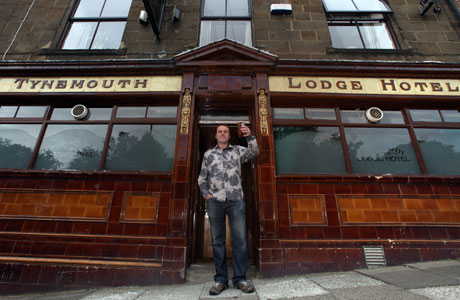It’s back to basics for Tynemouth Lodge boss
Sep 4 2011 by Michael Brown, Sunday Sun
LANDLORDS in the North are toiling away for long hours and little pay, a new study claims.
And the situation is being made worse by the actions of big pub companies who leave their tenants “without a sporting chance”.
The findings, published in a new report, say that nearly half of all publicans in “tied” pubs are earning less than £15,000 a year and almost 40% plan on giving up by 2014.
Hughie Price, who owns the successful Tynemouth Lodge Hotel, a free house in North Shields, said politicians were to blame for the bleak situation as they had allowed non-brewing businesses to buy up so many pubs.
He said: “The difference between a ‘free house’ and a ‘tied’ house is that the proprietor of a free house can negotiate and buy from any supplier they like, while a tied house has restrictions in place.
“It does make sense that a brewery be able to tie their tenants to own-brands in the interests of ensuring the long-term survival of the brewery.
“But it beggars belief that any pub-owning company without a brewery has been allowed by Government to enforce any tie whatsoever.
“In short, many tied pubs are not on a level playing field with a free house owner and consequently do not stand a sporting chance of lasting the course. This explains the high failure rate of big pub company tenants.”
Hughie’s pub, The Tynemouth Lodge, is well known for its back to basics approach.
And he’s offering some clues to his success as part of our Back Our Boozers campaign.
The Sunday Sun is running a series of articles that highlights how pubs are an essential part of our culture – with advice on how to thrive.
The Lodge has a no frills approach with just tables, chairs and the bar so customers can enjoy a pint the old fashioned way.
They have banished the TV, the jukebox and pool table…it is just the pub.
And they say The Lodge is all about their community and helping local charities like the Tynemouth lifeboat.
The good news is that the IPPR report, written by politics research fellow Glenn Gottfrie and the institute’s associate director for public service reform Rick Muir, described pubs as “an integral part of Britain’s culture and way of life”.
“Outside the home, the pub is the most popular place for British people of all ages and classes to relax and socialise,” it said.
“Alongside the monarchy, the football match and the fish and chip shop, the pub is an iconic British institution.”
But it warns: “And yet pubs are under considerable pressure, with the latest figures showing that pubs are closing at a rate of 25 a week.
“The evidence of this is clear to see in the large number of boarded-up pubs along almost any British high street.
“We have found that tied publicans earn substantially less as a whole and are more likely to say they are struggling financially.
“There is a higher level of ‘churn’ in the tied sector and while we cannot conclude that this is due to higher financial pressures in that sector, neither – given our other findings – can we rule it out.
“As such, we believe that the Government should act to reform the way the industry operates. The Office of Fair Trading decided not to refer this matter on competition grounds, because it did not find evidence that consumers suffered from a lack of choice in a competitive market.
“However, even if this matter cannot be pursued on narrow competition grounds, the fact that a significant proportion of publicans appear to be being put under significant financial pressure is matter of serious concern. “This is not only because of the personal financial hardship involved but also because the sustainability of vital local amenities is being put under pressure. Any reform must have as its objective a rebalancing of the unequal relationship between pubcos and their lessees.”
One solution could be to see more residents’ groups forming and attempting to buy back their local so it can operate as a free house.
Tynemouth Lodge Hotel manager Damien King added that way a pub could cement its place as “more than just somewhere for drinking”.
He said: “I’ve been here 12 years and we’ve an old guy who comes in regularly, and if we’ve not seen him for a few days we know to go check on him and see if he’s all right”.
To read the full IPPR report visit www.ippr.org.
Read the original article here.

